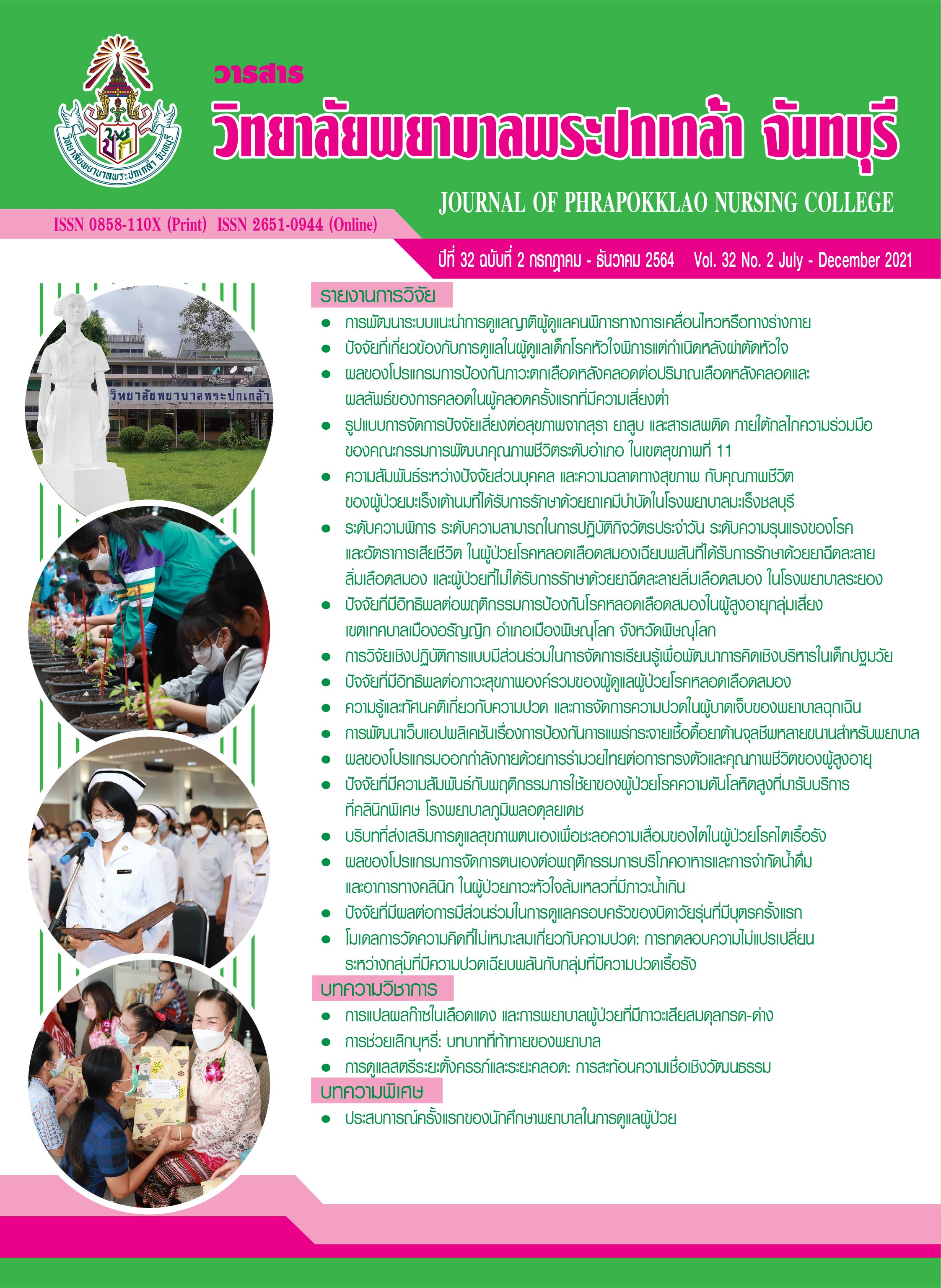The Participatory Action Research of Learning Management for Executive Function Development in Preschool Children
Keywords:
Executive function, Preschool children, Child care center, Participatory action researchAbstract
This participatory action research aimed to study the participation in learning management and to determine the effects of the learning management for executive function development in preschool children. The participants were composed of ten personnel of Child Development Center, Phrapokklao Nursing College, Chanthaburi, 60 parents, and 60 children aged 3 to 5 years old. The research instruments included the child’s data record form, the executive function in preschool children assessment form with reliability as .90, the problematic behaviors regarding executive function in preschool children assessment form with reliability as .98, and the focus group guide. Two cycles of this research (each cycle comprised 4 steps including plan, do, check, and act) were conducted from January to August, 2020. Data were analyzed using frequency, percentage, mean, standard deviation, paired t-test, independent t-test, and content analysis.
The research results revealed that 1) the guideline of learning management for executive function development in preschool children should focus on activity-based instruction including individual and group activities; 2) after receiving the instruction that promoted executive function, the preschool children had statistically significant higher mean scores of three domains of executive function (inhibit, shift, and emotional control) than those of before receiving the instruction (p < .001); and 3) after the experiment, the preschool children who received the instruction that promoted executive function had statistically significant higher mean score of problematic behaviors regarding executive function than the preschool children who received the Montessori instruction (t = 2.047, p < .05).
This research suggests that the Child Development Center, Phrapokklao Nursing College, Chanthaburi should further develop the learning activities that promote all domains of executive function in preschool children as well as promote the learning activities that reduce the problematic behaviors regarding executive function.
References
จุฬินฑิพา นพคุณ. (2561). การพัฒนาทักษะสมองเพื่อชีวิตที่สําเร็จในศตวรรษที่ 21 สําหรับเด็กปฐมวัยผ่านการสอนแบบมอนเตสซอรี่. วารสารศึกษาศาสตร์ มหาวิทยาลัยศิลปากร, 16(1), 75–90.
นวลจันทร์ จุฑาภักดีกุล. (2562). คู่มือการอบรมเชิงปฏิบัติการเรื่องการประเมินพัฒนาการด้านการคิดเชิงบริหาร (Executive Function) ในเด็กปฐมวัย. นครปฐม: สถาบันชีววิทยาศาสตร์โมเลกุล และสถาบันแห่งชาติเพื่อการพัฒนาเด็กและครอบครัว มหาวิทยาลัยมหิดล.
นวลจันทร์ จุฑาภักดีกุล, นุชนาฏ รักษี, ปนัดดา ธนเศรษฐกร, และอรพินท์ เลิศอวัสดาตระกูล. (2560). การพัฒนาและหาค่าเกณฑ์มาตรฐานเครื่องมือประเมินการคิดเชิงบริหารในเด็กปฐมวัย. นครปฐม: สถาบันชีววิทยาศาสตร์โมเลกุล และสถาบันแห่งชาติเพื่อการพัฒนาเด็กและครอบครัว มหาวิทยาลัยมหิดล.
ประเสริฐ ผลิตผลการพิมพ์. (2561 ก). เลี้ยงลูกอย่างไรให้ได้ EF (พิมพ์ครั้งที่ 4). กรุงเทพฯ. แพรวเพื่อนเด็ก.
ประเสริฐ ผลิตผลการพิมพ์. (2561 ข). EF อย่างสั้นที่สุด. สืบค้นจาก https://www.rlg-ef.com/download/ef--อย่างสั้นที่สุด-โดย-นพ-ป
เพ็ญพรรณ จิตตะเสนีย์. (2560). เด็กไทยร่วม 30% มีปัญหาการคิดเชิงบริหาร. สืบค้นจาก https://www.dailynews.co.th/education/612594
วรสิทธิ์ ศิริพรพาณิชย์, และนัยพินิจ คชภักดี. (2561). บทบาทของสมองต่อพัฒนาการเด็ก. ใน สุรีย์ลักษณ์ สุจริตพงศ์, รวิวรรณ รุ่งไพรวัลย์, ทิพวรรณ หรรษคุณาชัย, บานชื่น เบญจสุวรรณเทพ, อดิศร์สุดา เฟื่องฟู, จริยา จุฑาภิสิทธิ์, และพัฏ โรจน์มหามงคล (บ.ก.), ตำราพัฒนาการและพฤติกรรมเด็ก เล่ม 4 (น. 3–18). กรุงเทพฯ: พี.เอ. ลีฟวิ่ง.
วีระศักดิ์ ชลไชยะ. (2561). การทำหน้าที่บริหารของสมองระดับสูง. ใน สุรีย์ลักษณ์ สุจริตพงศ์, รวิวรรณ รุ่งไพรวัลย์, ทิพวรรณ หรรษคุณาชัย, บานชื่น เบญจสุวรรณเทพ, อดิศร์สุดา เฟื่องฟู, จริยา จุฑาภิสิทธิ์, และพัฏ โรจน์มหามงคล (บ.ก.), ตำราพัฒนาการและพฤติกรรมเด็ก เล่ม 4 (น. 19–42). กรุงเทพฯ: พี.เอ. ลีฟวิ่ง.
สุภาวดี หาญเมธี, ธิดา พิทักษ์สินสุข, และภาวนา อร่ามฤทธิ์. (บ.ก.). (2561). คู่มือพัฒนาทักษะสมอง EF Executive Functions สำหรับครูปฐมวัย. กรุงเทพฯ: มติชน.
อมาวสี อัมพันศิริรัตน์, และพิมพิมล วงศ์ไชยา. (2560). การวิจัยเชิงปฏิบัติการแบบมีส่วนร่วม: ลักษณะสำคัญและการประยุกต์ใช้ในชุมชน. วารสารมนุษยศาสตร์และสังคมศาสตร์ มหาวิทยาลัยมหาสารคาม, 36(6), 192–202.
Baler, R. D., & Volkow, N. D. (2006). Drug addiction: The neurobiology of disrupted self-control. Trends in Molecular Medicine, 12(12), 559–566. doi:10.1016/j.molmed.2006.10.005
Cogorno Maldonado, R. (2021). The impact of extended recess with loose parts play on Montessori primary student self-regulation and on-task behaviour. Retrieved from https://sophia.stkate.edu/cgi/viewcontent.cgi?article=1396&context=maed
Kosokabe, T., Mizusaki, M., Nagaoka, W., Honda, M., Suzuki, N., Naoi, R., & Moriguchi, Y. (2021). Self-directed dramatic and music play programs enhance executive function in Japanese children. Trends in Neuroscience and Education, 24, 100158. doi:10.1016/j.tine.2021.100158
Lillard, A. S., Heise, M. J., Richey, E. M., Tong, X., Hart, A., & Bray, P. M. (2017). Montessori preschool elevates and equalizes child outcomes: A longitudinal study. Retrieved from https://doi.org/10.3389/fpsyg.2017.01783
Moffitt, T. E., Arseneault, L., Belsky, D., Dickson, N., Hancox, R. J., Harrington, H., … Caspi, A. (2011). A gradient of childhood self-control predicts health, wealth, and public safety. Proceedings of the National Academy of Sciences, 108(7), 2693–2698.
Zierden, K. (2021). Influences on children’s executive function skills development (Master’s thesis). St. Paul, MN: Concordia University. Retrieved from https://digitalcommons.csp.edu/teacher education_masters/5
Downloads
Published
How to Cite
Issue
Section
License
Copyright (c) 2021 JOURNAL OF PHRAPOKKLAO NURSING COLLEGE

This work is licensed under a Creative Commons Attribution-NonCommercial-NoDerivatives 4.0 International License.
เนื้อความ ข้อมูล และรายการอ้างอิงที่ผู้เขียนใช้ในการเขียนบทความเพื่อลงตีพิมพ์ในวารสารวิทยาลัยพยาบาลพระปกเกล้า จันทบุรี ถือเป็นความคิดเห็นและความรับผิดชอบของผู้เขียน คณะผู้จัดทำวารสารไม่จำเป็นต้องเห็นพ้องด้วยหรือร่วมรับผิดชอบ
บทความที่ได้รับการลงตีพิมพ์ในวารสารวิทยาลัยพยาบาลพระปกเกล้า จันทบุรี ถือเป็นลิขสิทธิ์ของวารสารวิทยาลัยพยาบาลพระปกเกล้า จันทบุรี หากหน่วยงานหรือบุคคลใดต้องการนำส่วนหนึ่งหรือทั้งหมดของบทความไปเผยแพร่ต่อเพื่อวัตถุประสงค์ใด ๆ จะต้องได้รับอนุญาตจากบรรณาธิการวารสารก่อน



